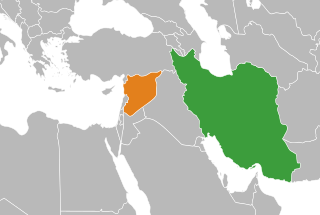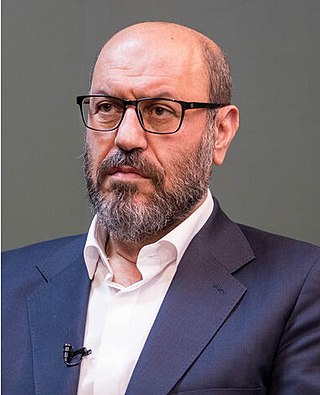Kioumars Pourhashemi | |
|---|---|
| Died | 28 November 2024 Aleppo, Syria |
| Allegiance | |
| Service | IRGC |
| Rank | Brigadier General |
| Unit | Iranian IRGC |
| Commands | Quds Force |
Kioumars Pourhashemi (Persian : کیومرث پورهاشمی; died 28 November 2024) was an Iranian general. [1]
Kioumars Pourhashemi | |
|---|---|
| Died | 28 November 2024 Aleppo, Syria |
| Allegiance | |
| Service | IRGC |
| Rank | Brigadier General |
| Unit | Iranian IRGC |
| Commands | Quds Force |
Kioumars Pourhashemi (Persian : کیومرث پورهاشمی; died 28 November 2024) was an Iranian general. [1]
Pourhashemi was an Iranian IRGC-Quds Force military officer who served as an Iranian military advisor to Syria during the Syrian Civil War. On 28 November 2024, he was killed during the Battle of Aleppo by Tahrir al-Sham militants. [2] [3] [4]

The Islamic Revolutionary Guard Corps, also known as the Iranian Revolutionary Guards, is a multi-service primary branch of the Iranian Armed Forces. It was officially established by Ruhollah Khomeini as a military branch in May 1979 in the aftermath of the Iranian Revolution. Whereas the Iranian Army protects the country's sovereignty in a traditional capacity, the IRGC's constitutional mandate is to ensure the integrity of the Islamic Republic. Most interpretations of this mandate assert that it entrusts the IRGC with preventing foreign interference in Iran, thwarting coups by the traditional military, and crushing "deviant movements" that harm the ideological legacy of the Islamic Revolution. Currently, the IRGC is designated as a terrorist organization by Bahrain, Canada, Saudi Arabia, Sweden and the United States.

The Quds Force is one of five branches of Iran's Islamic Revolutionary Guard Corps (IRGC) specializing in unconventional warfare and military intelligence operations. U.S. Army's Iraq War General Stanley McChrystal describes the Quds Force as an organization analogous to a combination of the CIA and the Joint Special Operations Command (JSOC) in the United States. Responsible for extraterritorial operations, the Quds Force supports non-state actors in many countries, including Hezbollah, Hamas, Palestinian Islamic Jihad, the Houthi movement, and Shia militias in Iraq, Syria, and Afghanistan. According to Michael Wigginton et al., the Al-Quds Force is "a classic example of state-sponsored terrorism."

The Iranian Armed Forces, officially the Islamic Republic of Iran Armed Forces, are the combined military forces of Iran, comprising the Islamic Republic of Iran Army (Artesh), the Islamic Revolutionary Guard Corps (Sepah) and the Law Enforcement Command (Faraja).

The Institute for Intelligence and Special Operations, popularly known as Mossad, is the national intelligence agency of the State of Israel. It is one of the main entities in the Israeli Intelligence Community, along with Aman and Shin Bet.

The Syrian civil war is an ongoing multi-sided conflict in Syria involving various state-sponsored and non-state actors. In March 2011, popular discontent with the rule of Bashar al-Assad triggered large-scale protests and pro-democracy rallies across Syria, as part of the wider Arab Spring protests in the region. After months of crackdown by the government's security apparatus, various armed rebel groups such as the Free Syrian Army began forming across the country, marking the beginning of the Syrian insurgency. By mid-2012, the insurgency had escalated into a full-blown civil war.

Syria and Iran are strategic allies. Syria is usually called Iran's "closest ally", notwithstanding the conflict between the Arab nationalism ideology of Syria's secular ruling Ba'ath Party and the Islamic Republic of Iran's pan-Islamist policy. Iran and Syria have had a strategic alliance ever since the Iran–Iraq War, when Syria sided with non-Arab Iran against neighbouring Ba'ath-ruled Iraq. The two countries shared a common animosity towards then-Iraqi president Saddam Hussein and coordination against the United States and Israel.
The 2012–2014 Quneitra Governorate clashes began in early November 2012, when the Syrian Army began engaging with rebels in several towns and villages of the Quneitra Governorate. The clashes quickly intensified and spilled into the UN-supervised neutral demilitarized zone between Syrian controlled territory and the Israeli-occupied Golan Heights.

The Iran–Israel proxy conflict, also known as the Iran–Israel proxy war or Iran–Israel Cold War, is an ongoing proxy conflict between Iran and Israel. In the Israeli–Lebanese conflict, Iran has supported Lebanese Shia militias, most notably Hezbollah. In the Israeli–Palestinian conflict, Iran has backed Palestinian groups such as Hamas. Israel has supported Iranian rebels, such as the People's Mujahedin of Iran, conducted airstrikes against Iranian allies in Syria and assassinated Iranian nuclear scientists. In 2018 Israeli forces directly attacked Iranian forces in Syria.
A number of states and armed groups have involved themselves in the Syrian civil war (2011–present) as belligerents. The main groups are the Syrian Arab Republic and allies, the Syrian opposition and allies, Al-Qaeda and affiliates, Islamic State, and the originally mostly Kurdish Syrian Democratic Forces.

Hossein Dehghani Poudeh, commonly known as Hossein Dehghan, is an Iranian military officer and former IRGC Air Force officer with the rank of brigadier general. He is currently head of the Mostazafan Foundation since 2023.

The Islamic Republic of Iran and the Syrian Arab Republic are close strategic allies, and Iran has provided significant support for the Syrian government in the Syrian civil war, including logistical, technical and financial support, as well as training and some combat troops. Iran sees the survival of the Syrian government as being crucial to its regional interests. When the uprising developed into the Syrian Civil War, there were increasing reports of Iranian military support, and of Iranian training of the National Defence Forces both in Syria and Iran. From late 2011 and early 2012, Iran's IRGC began sending tens of thousands of Iranian troops and foreign paramilitary volunteers in coordination with the Syrian government to prevent the collapse of the Syrian Arab Army; thereby polarising the conflict along sectarian lines.
Major General Suhayl al-Hasan is a Syrian military officer, currently serving as the commander of the Syrian Army's Special Forces. He graduated from the Syrian Air Force academy in 1991, and served in many units in the Syrian Air Defence Force Command, completing several training courses. Following his service in the Syrian Air Force and Air Defence units, he joined the Air Force Intelligence service, where he was responsible for the training of the elements of the Special Operations Section. During the Syrian Civil War, al-Hasan has served and commanded his troops during several major engagements, including Operation Canopus Star and the battle for the Shaer gas field. He is part of the new generation of field Syrian army commanders who emerged during the civil war. French newspaper Le Monde has claimed he could be a rival to Assad as leader of Syria.

The Aleppo offensive was a Syrian Army large-scale strategic offensive south of Aleppo. The main objective of the operation was to secure the Azzan Mountains, while also creating a larger buffer zone around the only highway to the provincial capital controlled by the Syrian government. A related objective was to establish favourable conditions for a planned offensive to isolate rebel forces in Aleppo City and to relieve the long-standing siege of a pro-government enclave in Aleppo Governorate.

Mohammad Reza Zahedi was an Iranian military officer. A senior figure within the Islamic Revolutionary Guard Corps (IRGC), he had previously commanded the IRGC Aerospace Force and the IRGC Ground Forces, and was commanding the Quds Force in Lebanon and Syria at the time of his death.
The Iran–Israel conflict during the Syrian civil war refers to the Iranian–Israeli standoff in and around Syria during the Syrian conflict. With increasing Iranian involvement in Syria from 2011 onwards, the conflict shifted from a proxy war into a direct confrontation by early 2018.
The Syrian Desert campaign is a campaign waged by Syrian government forces and their allies, including Iran and Russia, against the remaining forces of the Islamic State (IS) in the Syrian Desert region.

Esmail Qaani is an Iranian brigadier general in the Islamic Revolutionary Guard Corps (IRGC) and commander of its Quds Force, a division primarily responsible for extraterritorial operations. The Supreme Leader of Iran, Ali Khamenei, appointed Qaani to succeed Qasem Soleimani as Commander of the Quds Force.

Starting on 2 December 2022, a series of intensified clashes broke out of the frontlines of the 'Idlib de-escalation zone' located in the governorates of Idlib, Aleppo, Hama and Latakia. These confrontations initiated through inghimasi, infiltration and sniper attacks by Hayat Tahrir al-Sham (HTS) and allied militant groups against positions held by the pro-government Syrian Arab Army (SAA) positions. These attacks were called We Will Not Reconcile by HTS. In 2023, the first territorial offensive since 2020 was carried out by HTS in the area of Milaja.

On 27 November 2024, a coalition of Syrian opposition groups called the Military Operations Command led by Hay'at Tahrir al-Sham (HTS) and allied Turkish-backed groups in the Syrian National Army (SNA) launched an offensive against the pro-government Syrian Arab Army (SAA) forces in Idlib, Aleppo and Hama Governorates in Syria. Codenamed Deterrence of Aggression by HTS and stated as being launched in retaliation for the increased SAA shelling of civilians in the Western Aleppo countryside, the operation is the first time opposition forces launched a military offensive campaign since the March 2020 Idlib ceasefire.